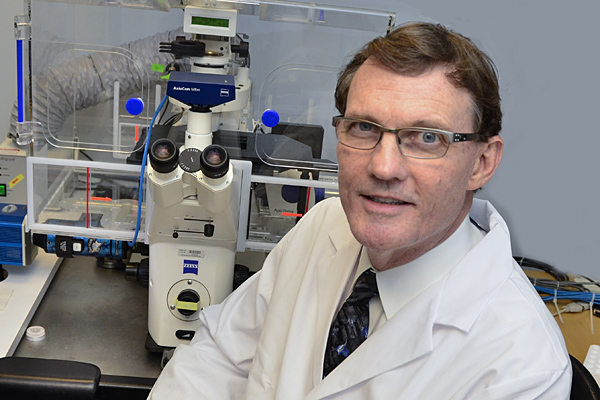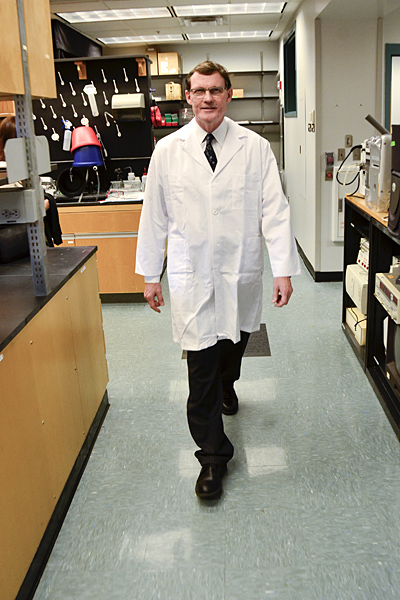Tampa, FL (June 13, 2012) — Stephen B. Liggett, MD, a pioneer in the emerging field of personalized medicine, will help USF Health build an interdisciplinary center that will be a national leader in driving research needed to tap patients’ unique DNA profiles to tailor their medical care.
Dr. Liggett, who will direct the USF Center for Personalized Medicine and Genomics, joined the University of South Florida June 11. He is vice dean for personalized medicine and genomics at the Morsani College of Medicine, USF Health associate vice president for personalized medicine, and professor in the Department of Internal Medicine. He will hold a joint appointment in the Department of Molecular Pharmacology and Physiology.

Dr. Stephen Liggett brings to USF Health a multi-million dollar NIH portfolio.
Dr. Liggett came to USF from the University of Maryland School of Medicine in Baltimore, where he was associate dean for interdisciplinary research and professor of medicine and physiology. Supported by a multi-million dollar portfolio of NIH grants, he studies genetic variations in people and pathogens, with a focus on signaling genes relevant to heart and lung diseases.
“We are very fortunate to have recruited Dr. Liggett; he was highly sought after by other universities both in Florida and across the country,” said Stephen K. Klasko, MD, MBA, CEO of USF Health and dean of the Morsani College of Medicine. “Dr. Liggett’s leadership and expertise will be critical in helping USF Health, the Tampa Bay region and the state of Florida advance in genomics-based personalized medicine for heart and other diseases. This is the future of medicine – another terrific opportunity for us to be at the forefront of transforming how health care is provided to patients.”
If the promise of personalized medicine is realized, physicians could mine a person’s genetic code, or genome, for information to predict the individual’s disease risk, disease progression, or severity, and response to treatment. They would take into account the patient’s unique genetic profile and physiology, including an individual’s ability to metabolize particular drugs, to select the best treatment and determine the right dosage.
Dr. Liggett describes genomics-based personalized medicine as a powerful, targeted approach that could achieve a level of optimal care surpassing current outcomes.
“Using a person’s genetic code to tailor their treatments eliminates the ‘trial-and-error’ approach, which is the way medicine is practiced now,” Dr. Liggett said. “We need to use the most sophisticated information we can to give patients receiving a diagnosis their best medication options right away, particularly for aggressive diseases where time is of the essence.”
At USF, Dr. Liggett will work with faculty members across multiple disciplines, incorporating personalized medicine in varying degrees into the research and practice of medicine. The research will emphasize finding links between differences in genes sequences and responses to treatment, so that eventually genetic tests can be developed to help improve the safety and effectiveness of therapy and to lower costs.

Dr. Liggett’s initial collaborations will include Leslie Miller, MD, chair of cardiovascular sciences at the Morsani College of Medicine and leader of the USF Health Heart Institute. In April, the Heart Institute received a combined $8.9 million in state and county funding, which will allow USF Health to join with industry and academic partners to begin developing new genomics-based personalized approaches to health.
“There is a pressing need to bring to bear all our tools, including personalized medicine, to prevent and treat cardiovascular disease, the most common cause of death in the U.S., Florida and the Tampa Bay region,” Dr. Liggett said. “USF has already invested substantially in laying a foundation for personalized medicine in heart disease. So, to leverage this effort, one of the first group of diseases we target will be cardiovascular.”
Advances in the field of personalized medicine are expected to multiply over the next decade with strides in the clinical interpretation of genome sequencing and increases in the number of diseases that can be precisely diagnosed and then treated with a highly targeted therapy. Work by Dr. Liggett’s laboratory’s has led to greater understanding of how variations of genes and families of genes affect the disease processes of congestive heart failure and asthma and how a patient’s genetic makeup can be used to tailor drug treatment.
Among his accomplishments:
- At the University of Maryland, Dr. Liggett and colleagues identified a gene variation that appears to help determine which patients with heart failure will benefit from a beta-blocker drug commonly used to treat the chronic disease. That is important because it often takes several months to determine if a specific beta blocker is working for a patient.
- Dr. Liggett’s genomic investigations in heart failure have generated $6.1 million in National Institutes of Health grants, 10 new patents and resulted in the creation of two biotechnology companies.
- Dr. Liggett’s University of Maryland team, working with colleagues at the University of Wisconsin-Madison, for the first time mapped out the entire genome of nearly 100 different strains of the common cold virus. The work, published in the journal Science, may provide a powerful tool leading to the first effective treatments for the common cold.
- Dr Liggettt’s team used a genomics-based drug discovery method that he pioneered to discover taste receptors in the lung and found a new target for treating asthma. This work, published in Nature Medicine, has stirred renewed interest internationally on development of new drugs for asthma and emphysema.
Dr. Liggett received an MD degree from the University of Miami School of Medicine. He completed his residency in internal medicine and a fellowship in pulmonary and critical care medicine at Washington University School of Medicine and Barnes Hospital in St. Louis. Following a laboratory-based postdoctoral fellowship at the Howard Hughes Medical Institute at Duke University, he joined the faculty at Duke and then the University of Cincinnati College of Medicine.
At the University of Cincinnati, Dr. Liggett was the Taylor Endowed Professor of Medicine, Pharmacology and Molecular Genetics, and served as chief of the Pulmonary and Critical Care Division. He moved to the University of Maryland in 2005.
Dr. Liggett has served on numerous NIH study sections and committees of the American Lung Association. He is a member of the Personalized Medicine Coalition’s Clinical Science Committee, working to advance the understanding and adoption of personalized medicine to benefit patients. He is an editorial board member for several high-impact journals and has authored more than 200 publications, including papers in peer-reviewed journals, book chapters and reviews.
-USF Health-
USF Health’s mission is to envision and implement the future of health. It is the partnership of the USF Health Morsani College of Medicine, the College of Nursing, the College of Public Health, the College of Pharmacy, the School of Biomedical Sciences and the School of Physical Therapy and Rehabilitation Sciences; and the USF Physician’s Group. The University of South Florida is a global research university ranked 50th in the nation by the National Science Foundation for both federal and total research expenditures among all U.S. universities.
Photos by Eric Younghans, USF Health Communications
Media contact:
Anne DeLotto Baier, USF Health Communications, (813) 974-3303 or abaier@health.usf.edu
